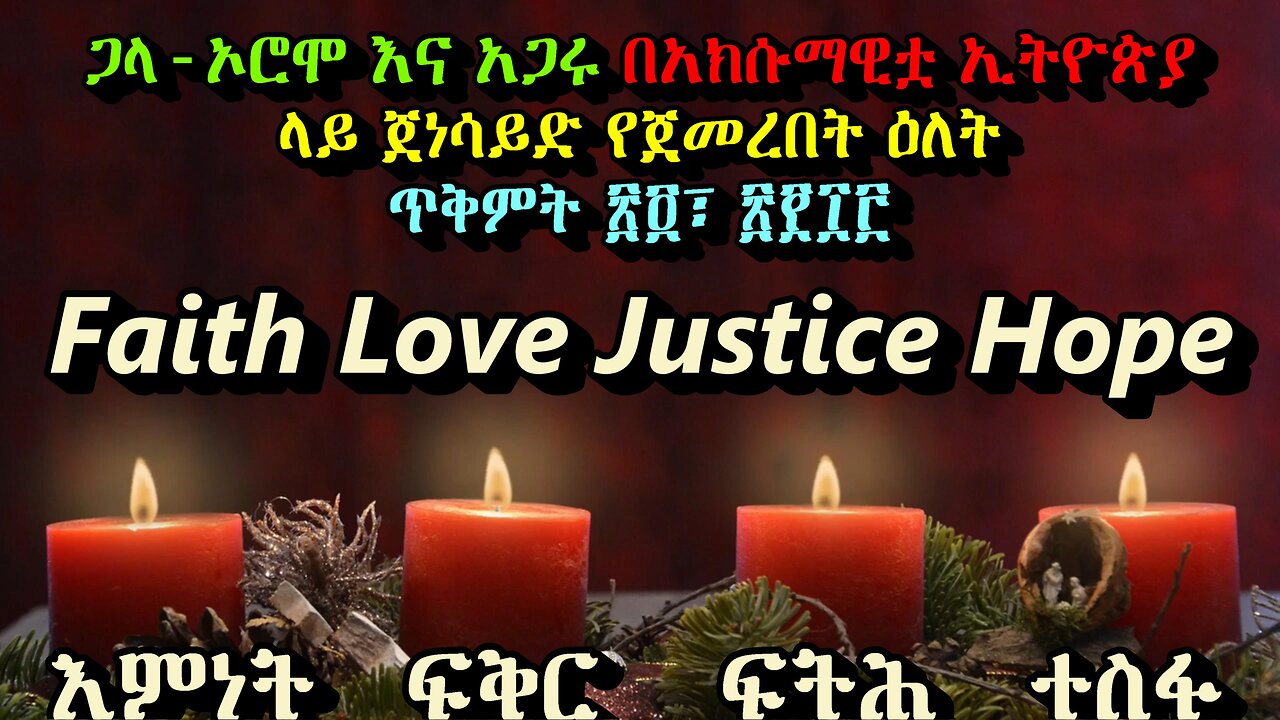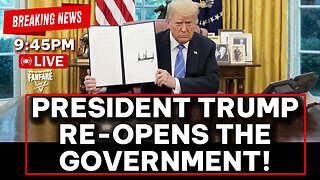Premium Only Content

Turning a Blind Eye – The politicization of Genocide: The case of Ethiopia
👏 From American University: Journal of International Service, By Johanna Suh-Hee Rothe, May 20, 2025
👏 THANK YOU, Dear Johanna! She is Korean-American – and I love Koreans! 💓
⚠️Content Warning: This piece contains descriptions and discussions of genocide, including references to mass violence, death, torture, sexual violence, and other forms of extreme human suffering.
After the atrocities of World War II, the international community recognized the absence of sufficient legal frameworks to define and prosecute the horrors of the Holocaust and the worst of human cruelty. The Genocide Convention, adopted in 1948 and ratified by 153 parties in 1951, was a response to fill this international vacuum.[ii] It established a legal framework aimed at preventing future atrocities and ensuring timely intervention. Yet, despite these legally binding commitments, the international community continues to fall short in upholding these standards, and the mechanisms established to protect the most vulnerable often prove ineffective. One only needs to glance at the news to witness unimaginable human suffering occurring around the world, while political considerations, economic alliances, and diplomatic maneuvering often lead to selective enforcement. The case of Ethiopia exemplifies this failure: despite credible evidence of mass atrocities, the international community remains largely inactive, prioritizing strategic interests over humanitarian intervention.
This paper argues that the international system established to prevent and prosecute genocide is fundamentally flawed, as its effectiveness is consistently undermined by political interests and selective enforcement, allowing states and actors to circumvent accountability with impunity. The first section will outline the broader international legal framework for genocide, followed by an analysis of how these laws have been violated in the case of Ethiopia. The paper will conclude by demonstrating how the international community’s inaction was not due to a lack of information or awareness, but rather a deliberate political choice, driven by competing interests and systemic limitations.
International legal framework for genocide
Article II of the Genocide Convention establishes a definition under which the signatory states acknowledge certain grave transgressions that meet the classification for genocide. The physical acts outlined in the convention that define genocide are as follows:
“(a) killing members of a group; (b) causing serious bodily or mental harm to members of the group; (c) deliberately inflicting on the group conditions of life calculated to bring about its physical destruction in whole or in part; (d) imposing measures intended to prevent births within the group; (e) forcibly transferring children of the group to another group.”[iii]
Article III of the Genocide Convention recognizes that the following acts are punishable: “(a) genocide; (b) conspiracy to commit genocide; (c) direct and public incitement to commit genocide; (d) attempt to commit genocide; (e) complicity in genocide.”[iv] These articles also specify the mental conditions under which the perpetrators must have committed these crimes: “{…} with intent to destroy, in whole or in part, a national, ethnical, racial, or religious group.”[v] This stipulates that the criminal act (actus reus) itself is insufficient to receive such classification, and it is necessary to prove the intent (dolus specialis) of the perpetrator(s) to destroy, in whole or in part, a specific group based on a certain intent.[vi]
Additionally, the International Court of Justice (ICJ) has repeatedly stated that “{…} these principles underlying the Convention are principles which are recognized by civilized nations as binding on States, even without any conventional obligation”, effectively enshrining the prohibition of genocide as a fundamental principle of international law.[vii] According to the ICJ, this peremptory norm (jus cogens) is an obligation erga omnes;[viii] terminology that describes an inherent obligation owed by all states to the international community as a whole.[ix] In short, a jus cogens norm is a fundamental and legally binding principle that applies to all states, regardless of their consent, overriding any conflicting laws, and cannot be ignored or suspended. These legal frameworks, in theory, ensure that all states have a mandatory duty to prevent and prosecute genocide, regardless of their political interests.
Turning a blind eye
Both investigative reports by the International Commission of Human Rights Experts on Ethiopia and the New Lines Institute, conclude that based on the available and verifiable information, there is a “reasonable basis to believe”[lxxx] that violations against international law have been committed. The key elements of the concluding statements, based on currently available evidence, are that the situation could amount to a possible genocide classification. However, even if all the verified information does not meet the genocidal threshold, experts warn of a continuation and even escalation of the conflict. There is significant evidence that remains uncovered and unreported, due to the Ethiopian Federal Government denying access for ICHREE to “any areas outside of Addis Ababa” and withholding relevant “documents and materials of interests.”[lxxxi] If the United Nations’ mission is, as Secretary-General Guterres stated: “Preventing genocide and other monstrous crimes [as] a shared responsibility and a core duty of the United Nations,”[lxxxii] two main questions arise. Firstly, if a fact-finding mission, established by the UN, presents truly disturbing evidence of committed atrocities, despite continued governmental refusal to cooperate and the inquiry emphasizes “the need for further investigation,”[lxxxiii] why would the mandate of this commission not be renewed?[lxxxiv] Secondly, if the evidence strongly suggests that the conflict may escalate beyond the threshold of genocide – and prevention, as affirmed by Secretary-General Guterres and international law, is a collective duty – why has the international community taken no concrete action to deescalate or address the situation?
Political strategic interests over human lives
Despite extensive documentation of atrocities in Tigray, the international community’s response has largely been symbolic. The UN’s promise to ‘continue monitoring’ and its appeal for international scrutiny[lxxxv] serve more as diplomatic placeholders, concealing international inaction with seeming political grand gestures, as an appeal for scrutiny is comparable to the consequences of a halfhearted finger wag.
A major obstacle to accountability lies in the refusal to label the atrocities as ‘genocide’. Instead, the international community and media have opted to refer to the conflict as ‘ethnic cleansing’, which has become a common practice euphemism to describe genocidal crimes. While the term ‘ethnic cleansing’ is emotionally evocative, it is a non-legal term that carries no legal obligations under international law. This semantic avoidance allows states to circumvent and avoid their moral and legal duties, as ethnic cleansing does not trigger the same legally binding Responsibility to Protect (R2P) obligations as genocide would. Avoidance of the term ‘genocide’ has the “same practical outcomes as genocide denial.”[lxxxvi]
Geopolitical and economic interests further explain the lack of response. Ethiopia’s strategic location in the Horn of Africa, which is crucial for migration control, counterterrorism efforts, and regional stability, makes it an indispensable partner for Western and non-Western powers. Ethiopia’s government has also strongly opposed external interference, framing the conflict as a domestic matter. China’s infrastructure investments and the West’s desire to preserve diplomatic relations have made states reluctant to risk confrontation. International inaction is not due to a lack of evidence but rather calculated political decisions.
Additionally, pledges by the Ethiopian government to pursue transitional justice mechanisms have been accepted at face value, despite serious concerns about their credibility. This form of “quasi compliance” in which superficial commitments are made to avoid scrutiny, is a recurring tactic for mass atrocity impunity, and yet, international actors continue to treat it as sufficient.[lxxxvii]
Conclusion
The situation in Tigray reveals the extent to which the international system designed to prevent and persecute genocide is crippled by selective enforcement and political self-interest. Despite clear evidence meeting the criteria of the Genocide Convention, meaningful action has been withheld not because of uncertainty but due to a prioritization of alliances and economic ties over justice and morality. This case highlights a sobering truth: without meaningful reform, the global pledge of “never again” will remain an empty promise.
-
 1:14:05
1:14:05
DeVory Darkins
16 hours agoDemocrats get BAD EPSTEIN NEWS after major mistake
181K141 -
 2:29:10
2:29:10
Badlands Media
10 hours agoDevolution Power Hour Ep. 406: Cracks in the Empire
238K22 -
 2:55:16
2:55:16
TimcastIRL
8 hours agoNEW Epstein Emails Drop, Dems Claim TRUMP KNEW, Congress Forces Epstein Release Vote | Timcast IRL
259K113 -
 1:19:53
1:19:53
Barry Cunningham
7 hours agoBREAKING NEWS: PRESIDENT TRUMP RE-OPENS THE UNITED STATES GOVERNMENT!
45.2K19 -
 20:47
20:47
The White House
8 hours agoPresident Trump Signs Senate Amendment to H.R. 5371
39.2K34 -
 4:37:57
4:37:57
Drew Hernandez
1 day agoNEW EPSTEIN EMAIL DROP FULLY POLITICIZED
63.5K28 -
 1:44:01
1:44:01
Tucker Carlson
7 hours agoTucker Carlson on the Israel First Meltdown and the Future of the America First Movement
74.8K438 -
 4:02:08
4:02:08
Alex Zedra
7 hours agoLIVE! Phasmaphobia New Map!
59.9K3 -
 2:16:06
2:16:06
Laura Loomer
9 hours agoEP155: Jihad Makes Its Move On The White House
51.9K63 -
 2:18:47
2:18:47
TheSaltyCracker
9 hours agoDem's Epstein Drop Backfires ReeEEStream 11-12-25
114K220